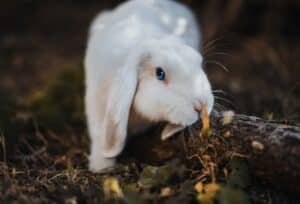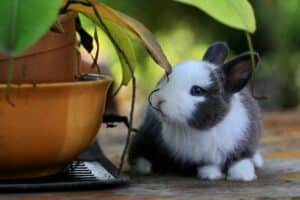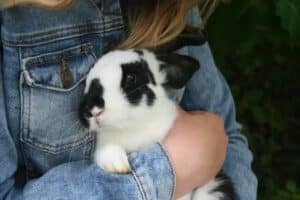Ever heard a rabbit make an unusual sound when you touched it? If so, you’re not alone – many owners of pet rabbits have been puzzled by this behavior. If your rabbit squeaks or makes another odd noise when you pat it, there may be several possible explanations.
In this blog post, we’ll explore the reasons why your rabbit might be making these strange noises and what they could mean. Read on to learn more about why your furry little friend is speaking out!
Why does my bunny make a weird noise when I pet him?
If you’ve noticed that your bunny makes a strange noise when you pet him, don’t worry – it’s a pretty common behavior. The noise is likely a sign of contentment and relaxation, rather than discomfort or pain.
Similar to a cat’s purr, rabbits will often make a faint grinding or chattering noise when they’re feeling calm and comfortable. Some bunnies will even close their eyes, twitch their noses, and lean into your hand as you pet them.
So, instead of being worried about the noise, take it as a sign that your furry friend is feeling happy and loved.
Why is my female rabbit whimpering?
As a rabbit owner, it can be concerning to hear your furry friend whimper. Whimpering can be a sign that something is wrong, and it’s important to investigate the possible causes. One reason why a female rabbit may whimper is if she is experiencing pain or discomfort.
This can be due to a variety of factors, such as an injury or illness. It’s important to observe your rabbit’s behavior and take note of any other symptoms she may be experiencing, such as a lack of appetite or lethargy. If you are ever unsure of what is causing your rabbit’s whimpering, it’s always best to consult with a veterinarian who specializes in rabbit care.
How can I tell if my bunny likes being a pet?
As pet owners, we always want our furry friends to feel loved and comfortable in our presence.
If you have a bunny, you may be wondering how you can tell if they enjoy being pet. Bunnies are social creatures and can often display signs of enjoyment when cuddled or stroked.
Look for signs like a relaxed posture, purring or grinding of teeth, and even licking or nuzzling your hand. However, each bunny has its own likes and dislikes, so be sure to observe its behavior and body language to determine what they enjoy the most.
With a little patience and attention, you can build a strong bond with your bunny that is built on trust and love.
What happy noises do rabbits make?
Rabbits are known for their adorable, fuzzy appearances, but did you know they can also make some pretty delightful noises? When rabbits are feeling happy and content, they often make a soft purring sound, similar to that of a cat.
This noise usually occurs when they are being petted or held by their owners. Additionally, rabbits may also make a rhythmic grinding noise with their teeth, known as “tooth purring,” which is another indication of their happiness.
Overall, these cheerful noises are just another reason why rabbits make such great pets!
Why does my bunny lower its head when I pet it?
Bunnies are adorably fluffy, and petting them can be a great way to bond with them. You may notice that when you pet your bunny, it lowers its head. This behavior is a sign of relaxation and trust.
When bunnies feel comfortable around humans, they will often lower their heads to indicate that they are enjoying the petting and feel safe in the hands of their caretaker. It’s an incredibly sweet gesture that shows the deep bond that can be formed between a bunny and its owner.
So next time you see your bunny lower its head while being petted, know that it’s a positive sign that your bunny is comfortable and happy in your presence.
How do rabbits express sadness?
Rabbits are known for their expressive behavior, especially when it comes to conveying their emotions. While most of us are aware of their happy hops and lively binkies, not many people know how rabbits express sadness.
When rabbits are downcast, they tend to retreat to their hiding places, becoming more silent and withdrawn than usual. Some rabbits may even refuse to eat or drink when they’re feeling low.
Moreover, if you closely observe their body language, you’ll notice that their ears droop down, their eyes may appear sad or distant, and they may hunch over. Though it’s not easy to see them sad, it’s important to give them some extra love and care in such times.
How do you read a rabbit’s body language?
When it comes to interacting with rabbits, understanding their body language is crucial. Unlike humans, rabbits communicate primarily through their body movements and postures.
Some signs of a happy rabbit include relaxed body language, a relaxed jaw, and a low-pitched purring sound. However, if a rabbit feels threatened, it may flatten its ears against its head, tense its body, or even thump its hind legs. Similarly, a rabbit in distress may make a high-pitched squealing sound or even growl.
By paying close attention to a rabbit’s body language, you can gain a better understanding of how they are feeling and adjust your behavior accordingly.
Do rabbits like being held like a baby?
Rabbits are social creatures that enjoy being around their owners, but they may not necessarily enjoy being held like a baby. While some may tolerate it, others may become stressed or scared by being restrained in such a way.
It’s important to remember that every rabbit has a unique personality and preferences, so what works for one bunny may not work for another. Instead of holding them like a baby, try sitting on the floor and allowing them to come to you for snuggles and pets.
This way, you can form a bond with your furry friend while also respecting their boundaries and comfort levels.
Why does my rabbit grunt when I feed him?
Rabbits are fascinating creatures that can have various methods of communication.
Grunting is one of the ways they express themselves. When your rabbit grunts while eating, it could be a sign of satisfaction. It means they are enjoying their meal, and it is a good sign for you as an owner. However, grunting can also signify aggression or stress.
Observe your rabbit’s body language and overall behavior to decipher the meaning behind the grunt. One thing is for sure; rabbits are intelligent animals, and understanding their language can enhance the bond between you and your furry friend.
Rabbit buzzing noise
Have you ever heard a rabbit make a buzzing noise? If not, it may surprise you to know that this is a common sound they make! Rabbits are vocal creatures and can communicate in a variety of ways.
The buzzing noise they make is often a sign of contentment or relaxation, similar to a cat’s purr. It’s a soft, low hum that can be heard when they are relaxing or being petted.
If you have a pet rabbit, try listening to this sound the next time you are spending time with them. It’s just one of the many unique noises they can make!
Do rabbits squeak at night?
If you’ve ever had a pet rabbit, you may have noticed some interesting noises coming from their cages at night. While rabbits are mostly known for their adorable little hops and nose twitches, they can also make quite the ruckus after the sun goes down.
Some bunny owners report hearing a distinct squeaking noise emanating from the rabbit hutch during the evening hours. But what could be causing this noise, and is it something to worry about?
While this may be a cause for concern for some new rabbit owners, fear not – there could be a perfectly valid explanation for why your rabbit is squeaking at night.
Why is my female rabbit growling at me?
You may have noticed an unexpected behavior from your female rabbit – growling. While rabbits are generally known for their gentle and cuddly demeanor, occasionally they may become protective or territorial.
This could be due to a variety of reasons, such as feeling threatened or fearful of their environment. It’s essential to give your rabbit space and time to calm down. Ensure their basic needs such as food, water, and shelter are being met, and avoid handling them forcefully.
Slowly and patiently, try to build trust with your rabbit through positive interactions and treats. With patience and love, you can help your rabbit feel more relaxed and comfortable around you.
Do bunnies squeak or squeal?
Bunnies are known for their adorable and soft appearance, but have you ever wondered how they communicate? Many people assume that bunnies make a high-pitched, cute little squeak sound, but the reality is quite different.
Bunnies make a loud “squeal” sound when they feel threatened or fearful. This sound is a warning signal to other bunnies to flee the area, making it an important survival instinct for these fluffy creatures.
So, next time you hear a bunny “squealing,” remember that it’s not just a cute noise, but an important form of communication.
What affection do rabbits like?
Rabbits are one of the most lovable and adorable pets to have. However, they can be quite sensitive creatures and may not show their affection as overtly as dogs and cats. That being said, rabbits do have their unique ways of showing affection.
Some common signs of a happy and content rabbit include binkying, where they jump up and twist their body in the air, lick their owners’ hands, and snuggle up next to their owners.
While every rabbit may have different preferences when it comes to affection, owners need to get to know their rabbits and their individual needs. So, if you’re looking for a fluffy and affectionate companion, a bunny might just be the perfect pet for you!
Do rabbits recognize their owners?
Rabbits are often viewed as cute, fluffy, and cuddly pets that can bring joy to anyone’s life. But do they actually recognize their owners? According to some experts, the answer is yes.
Rabbits are social animals that can bond with their owners and develop a sense of familiarity with them. They can recognize their owner’s scent, voice, and appearance, and may even respond differently to them than they would to a stranger.
However, like any other animal, individual rabbits can have their own personalities and preferences, so not all rabbits may exhibit signs of recognizing their owner. It’s important to spend time with your bunny and build a strong bond to increase the chances of them recognizing you as their beloved owner.
Do bunnies get sad when you leave?
Bunnies are undoubtedly one of the cutest and fluffiest pets you can have. They have a certain charm that can make anyone smile, and even their tiny bodies seem to be brimming with an endless supply of energy.
However, despite their seemingly happy-go-lucky nature, many bunny owners wonder if their fluffy friends get sad when they leave. The answer, like most things in life, is not so straightforward.
While bunnies aren’t capable of expressing emotions in the same way humans do, they can become lonely and even depressed when left alone for long periods.
It’s essential to ensure your bunny has plenty of toys, stimulation, and company to keep them happy and healthy.
So, next time you head out, make sure you leave your bunny surrounded by things they love, and they won’t be feeling bored.
Last notes on Why does my rabbit squeak when I pet her.
It’s clear that rabbits communicate with us through their squeaks, but there are many different reasons why our rabbit might squeak when we pet her. In the end, understanding a rabbit’s behavior and vocal cues is something that we build up a feeling about as owners.
Rabbits are complex creatures and figuring out why exactly she squeaks when we pet her may be an impossible task. But by paying attention to other behavioral patterns and changes in the environment that coincide with the squeaking, we can make educated guesses as to what she’s trying to tell us.
With plenty of patience and understanding from our side, hopefully, one day soon you can figure out your rabbit’s expression—and reply in some way!



